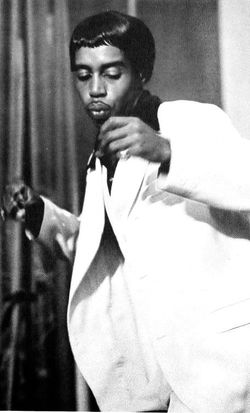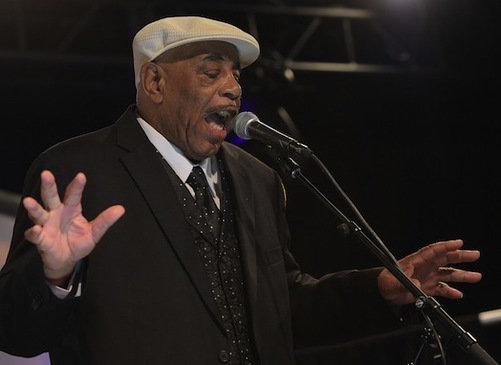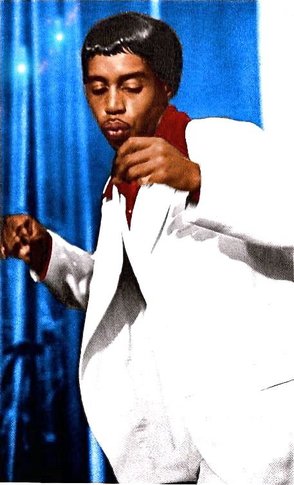 CLIFFORD CURRY IN THE 1960s
CLIFFORD CURRY IN THE 1960s There seems to be some disagreement as to where Clifford Curry was born, but there's no dispute that he was raised in Knoxville, Tennessee. Growing up, Cliff was schooled in Blues and R&B. And when I say "schooled", I mean that Clifford didn't just listen to the music--he studied it. After studying, the young Curry began writing--poems at first, then imagining the melodies to go with the words. By the time he got to high school, Clifford was already seen as a great singer who also had some smooth moves as a dancer. So, naturally, he was someone that every budding band wanted in their group. Initially, Curry threw in with The Echoes--a band that included a classmate of his, Benny Washington. Soon after, he was recruited by a band from a nearby all white high school. After Clifford joined, they called the band The Fabulous Six. It worked out for the 16 year old who, with the Echoes, sang for black audiences and, with the Fabulous Six, sang for white audiences. The Echoes quit high school to take their band on the road, but Curry didn't go with them. His father forbade it. Instead, he became part of another group, the Bingos.
 CLIFFORD CURRY IN 2014
CLIFFORD CURRY IN 2014 After graduating, Curry rejoined the Echoes who had returned home to East Tennessee. Again, Curry brought his original songs to the group. The band felt particularly good about "Mr. Moon" and decided to drive up to New York to audition for Atlantic Records. On a whim, they stopped in New Jersey where the Savoy label was based. Savoy signed the group on the spot, changing their name to The Five Pennies (odd, since the group had SIX members). The Five Pennies recorded six songs for the label, three of which were written by Curry.
Meanwhile, The Fabulous Six were still going strong and recorded some singles for a small Georgia label, though the label changed their name to the Contenders (anyone else reminded of the Oneders, here?). They lined up some regular gigs in Florida and were hugely popular...with everyone except the rival clubs. Eventually, one of the other clubs sent goons to the club where The Contenders were playing to incite fights and racial disruptions (remember, this is an all white group, aside from Curry). The fights caused the group to retreat north, back to Tennessee.
Clifford next joined another all white band, the Bubba Suggs Band. He was with them from 1959 - 1963, but left to focus on his songwriting. He recorded some sides for Excello, billed as Sweet Clifford, then joined another all white band, The Midnights, in 1965. Clifford and bandmate Rob Galbraith started working on Clifford's songs (Galbraith would work out the arrangements). They recorded a few on a tape recorder Clifford owned, but really needed some studio time and there were none in Knoxville. So they drove to Nashville, pitching the tunes but mostly came up empty. Or so they figured.
One of the people they met with was Buzz Cason, a writer, producer and publisher who had also sung with the Casuals, the Statues and some band called the Crickets. Yes, those Crickets. Cason wasn't all that taken with the songs, but he loved Clifford's voice. He sent Clifford a couple of songs (that Cason just happened to own the publishing rights for) and told him to get to Nashville to record them. The songs were "We're Gonna Hate Ourselves In The Morning" and "She Shot A Hole In My Soul". The year was 1967.
 COLORIZATION BY STUBBY
COLORIZATION BY STUBBY For the uninitiated, Beach Music is a southern and mostly coastal phenomenon. It's anything you can dance to, barefoot and in the sand. It's usually mid-tempo R&B, though that's a narrow and simplistic description, and horn sections are really big. "She Shot A Hole In My Soul" is quintessential Beach Music. The thing is, fans of Beach Music are passionate about the music. Extremely. Well, as a fellow Christmas music obsessive, you can probably understand that kind of passion. Beach Music territory runs from Virginia down through Georgia, but it's really really big in the Carolinas. And it is in these parts of the country that Curry's one "hit" turned into a 45 year career of sold out shows where he was virtually worshipped. Clifford continued recording, lots of singles and albums for lots of small labels. And he also wrote lots of great songs for lots of other artists.
As it happens, "She Shot A Hole In My Soul" wasn't really even a "hit", according to the usual standards. It spent three weeks on the charts in 1967 and peaked at #95 (as a radio guy, I wouldn't usually call something a hit unless it made the Top 40). I would have thought it did better with Cashbox, which included jukebox plays in their tabulations. But, no, it only lasted one week on the Cashbox charts, peaking at #95. On the R&B charts, it only reached #45. In the Carolinas, though? That song was a smash hit that went straight to #1 and stayed there. How big was it? "She Shot A Hole In My Soul" was what's known as a regional hit. And regional hits almost never chart nationally at all--not unless they get picked up by a major label. For the song to chart at all, with sales and airplay in just 7 (at most) of the 50 states? That's pretty amazing. Here in the south, Clifford Curry had a string of hits. He was a legend, a Soul Survivor, The King of Beach Music. In the rest of the country...not so much. Clifford was inducted into the Beach Music Hall of Fame in 1995, part of the Hall's original class.
I'd love to play you Clifford Curry's other Christmas song, "Santa, Bring Me Some Dancin' Shoes", but its not up on YouTube. But here's where you can buy the album it's on--"Southern Soul Christmas, Vol. 1". Also worth getting for the Poor Souls track. For a closing video, we'll just go with the flip, which is also brilliant.
 RSS Feed
RSS Feed

